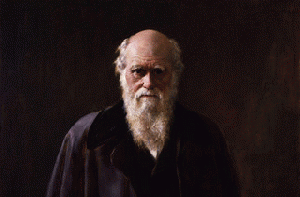A recent Gallup God created humans in their present form 10,000 years ago." In a March, 2014 Associated Press poll, 51 percent of Americans said they were "not too confident" or "not at all confident" that the statement "the universe began 13.8 billion years ago with a big bang" was correct. Most people who deny evolution (terrestrial or cosmic) do so for religious reasons.
The origin of all species, including humans, from simpler organisms through natural selection over billions of years is a central organizing principle of biological science. The "big bang" theory--that matter, energy and space-time itself emerged about 14 billion years ago from an infinitely dense, infinitesimally small "singularity--plays a similar role in cosmological science (the science of the universe). Scientists arrived at these over-arching theories using the same methods and standards of evidence that gave us the science underlying all our technology.
So rejecting evolution is either a wholesale rejection of science itself or else it amounts to cherry picking scientific conclusions. Given the centrality of science to modern life, a wholesale rejection is inconceivable.
Cherry picking--choosing for personal or non-scientific reasons which parts of science to believe--is incoherent and irrational. When someone boards an airliner or undergoes surgery, she bets her life on the reliability of aeronautical or medical science. What reason, then, could this person have for rejecting the evolutionary narrative that so much scientific evidence clearly implies?
Religiously motivated deniers of evolution often jump on the fact that biological and cosmic evolution are unfinished theories with important parts that are contested even by the scientists working on them. But this fact offers little comfort to those who want to see the universe as the work of a benevolent and all-powerful divinity. Whatever changes scientific cosmological theories undergo, they will still resort to impersonal, measurable events and forces devoid of purpose and nothing like the actions of a personal God.
Should we conclude that if we accept evolutionary science, we must reject any religious narrative about the origin and fate of the universe in which, as in Christianity, consciousness and purpose play a central role? Does the truth of the scientific master-narrative imply the falsehood of any other?
In a word, no. The dilemma is a false one, created by a clash of fundamentalisms. 'Fundamentalism' commonly refers to a kind of conservative Protestantism in the United States which insists on a very literal reading of the Bible. But the word has a more general sense: rigid adherence to a set of basic beliefs and passionate rejection of whatever challenges them. These beliefs define a community and create a sharp distinction between believers and outsiders.
A key dogma of science fundamentalism is scientism--which MIT physicist Ian Hutchinson defines as the claim that "science (modeled on the natural sciences) is the only source of real knowledge" about the world. From this perspective, there is nothing more to know or believe about the world and our place in it than what we learn using the methods of science.
Scientism is not itself a scientific claim; it adds nothing to scientific knowledge. It is, instead, a sweeping and very debatable philosophical claim embraced by many American philosophers and scientists (e.g. Daniel Dennett and Francis Crick).
Both fundamentalisms reject beliefs that outsiders see as supported by overwhelming evidence. Christian fundamentalists reject the evolution of species despite all the anatomical and genetic similarities across species, fossil records that include even transitional extinct species, and striking facts such as the presence of gills in human embryos.
Science fundamentalists deny something far more obvious to outsiders than anything denied by religious fundamentalists. They deny something each of us is aware of whenever we use the pronoun "I"--something so inherently private that we can't see it in the mirror or in anyone else.
Because this inner self or consciousness can't be observed or measured, it has no place in the world as described by science. Because science is the only source of knowledge and consciousness is inaccessible to science, these fundamentalists conclude that we have no basis for believing consciousness exists. This conclusion is so bizarre that it has credibility only in a small circle of very intelligent, highly educated people who validate each other and often scorn those who just don't get it.
Human experience, like the Bible, presents us with a text that can be read in various ways. Science and Christian fundamentalisms insist that their readings are the only possible ones. Yet their readings require us to ignore or distort large chunks of human experience. Better readings are available. Science doesn't need scientism. Millions of Christians who are not literalists manage accept evolution. They read the Bible as an expression of their faith in the centrality of persons and moral values within a universe that is more than what can be expressed in the language of science.






